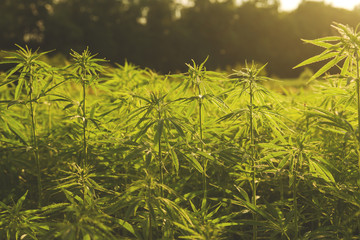Hemp is a versatile plant that belongs to the cannabis family but is distinct from marijuana due to its low THC (tetrahydrocannabinol) content. Hemp has been cultivated for thousands of years for various purposes, ranging from textiles to food. Its stalks, seeds, and oil contain valuable compounds that are used in numerous industries. As interest in sustainable and eco-friendly products grows, hemp has regained popularity for its potential environmental, health, and industrial benefits. From clothing to wellness products, hemp is emerging as a highly sustainable resource.
The Environmental Benefits of Hemp
Hemp is an eco-friendly crop that grows quickly and requires minimal resources. It doesn’t need pesticides or synthetic fertilizers, making it a sustainable option for farmers. Hemp also absorbs large amounts of carbon dioxide, helping to mitigate climate change. The plant is incredibly hardy, thriving in a variety of climates and soil types. Additionally, hemp can be grown in rotation with other crops, enriching the soil and promoting biodiversity. As demand for environmentally friendly products rises, hemp’s role as a sustainable material continues to expand.
Hemp in the Textile Industry
Hemp has been used for centuries in the textile industry to make fabrics like rope, sails, and clothing. Today, hemp textiles are making a strong comeback as consumers increasingly seek eco-conscious materials. Hemp fabric is durable, breathable, and biodegradable, offering a sustainable alternative to cotton and synthetic fibers. Unlike cotton, which requires large amounts of water and pesticides, hemp needs far fewer resources to grow, making it a more sustainable choice. The natural fibers of hemp also make it a popular option for eco-friendly fashion and home furnishings.
Hemp Seeds: A Superfood for Health and Nutrition
Hemp seeds are often referred to as a superfood due to their exceptional nutritional profile. They are packed with essential fatty acids, protein, vitamins, and minerals, making them an excellent addition to a balanced diet. Rich in omega-3 and omega-6 fatty acids, hemp seeds support heart health and brain function. They are also a complete source of protein, providing all nine essential amino acids. Hemp seeds can be eaten raw, added to smoothies, sprinkled on salads, or used in baking, offering numerous health benefits for those looking to improve their nutrition.
Hemp Oil: A Multi-Purpose Product
Hemp oil, derived from the seeds of the hemp plant, is known for its numerous health benefits. It is rich in essential fatty acids, antioxidants, and vitamins, making it an excellent option for skincare and wellness. Hemp oil helps hydrate and soothe dry skin, reduce inflammation, and promote a healthy complexion. In addition to its skincare uses, hemp oil is also consumed as a dietary supplement, providing benefits such as reducing anxiety, improving heart health, and supporting joint function. Its versatility makes hemp oil a popular product in both the wellness and beauty industries.
Conclusion
While hemp has been used for thousands of years, its legal status has fluctuated significantly in recent decades. In many parts of the world, hemp cultivation was banned due to its association with marijuana despite its non-intoxicating properties. However, recent changes in legislation, particularly in countries like the United States, have allowed hemp to be grown legally under certain regulations. The 2018 Farm Bill in the U.S. legalized the production of hemp with less than 0.3% THC, paving the way for hemp’s increased use in products such as CBD oil, textiles, and food products.
